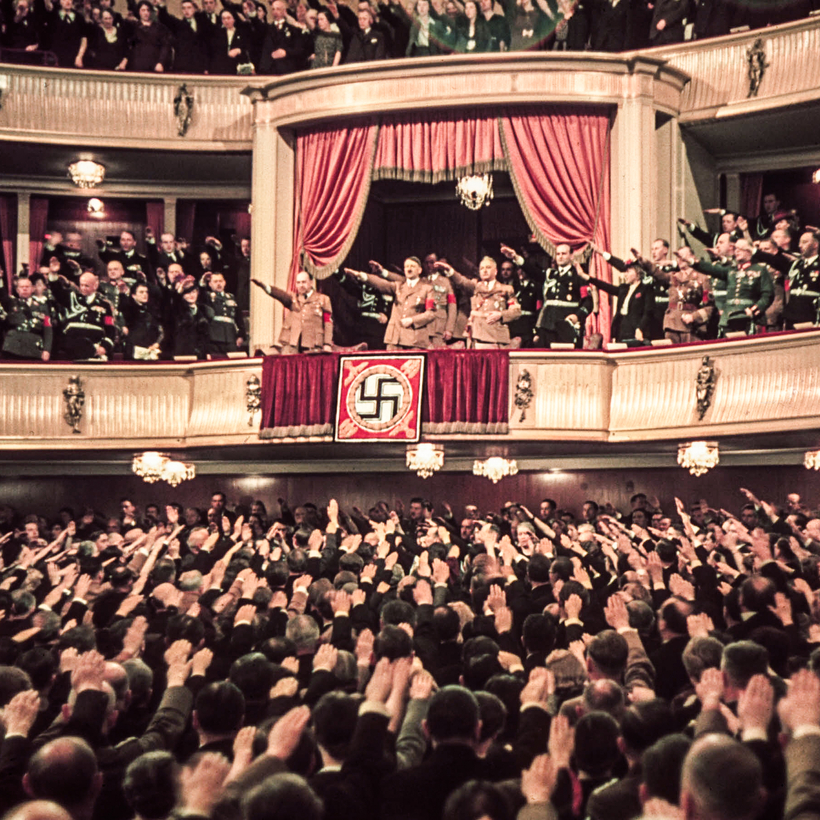As a teenager, seduced by the notion that it was possible to learn everything, I was drawn to fat books. One of the first I tackled was The Rise and Fall of the Third Reich, William Shirer’s monumental account of Nazi Germany. It was an early education in just how bad things can get.
Here in the age of Trump, which may either be blessedly nearing its end or approaching the midpoint, much has been written and aired about Trump’s esteem for thuggish dictators. And in his amorality, in his thinly veiled racism, in his disdain for (or ignorance of) democratic norms, in his outspoken scapegoating of entire religions and ethnic groups, he bears more than a passing resemblance to them. His more hysterical critics have seen a creeping potential for authoritarianism in Washington, fearing the dawn of some gold-veneered total Trumpism.
Cautionary Parallels
As a corrective, I recommend Shirer, not because the current cult of The Donald bears any resemblance to Nazism—in the immortal words of Walter Sobchak, “Say what you want about the tenets of National Socialism, Dude, at least it’s an ethos.” Donald Trump is no potential dictator and certainly no Adolf Hitler. Apart from the sheer scale of Nazi horrors, the Führer was an actual genius, as opposed to a self-declared “very stable” one. He was a dangerous pseudo-intellectual with clearly defined goals that he spelled out in minute detail in a wooden two-volume treatise years before he actually achieved power, and then proceeded to execute with cruel and stunning efficiency. The contrast with Trump, avid golfer and master of the misspelled adolescent tweet, is plain.
Nevertheless, there are cautionary parallels in Shirer’s book, mostly having to do with how readily educated Germans, people who considered themselves civilized, moral, and upright, fell in step with a monster.
More than a half-century since the book was published, it remains powerful. It is an achievement that Ron Rosenbaum, in his introduction to the 50th-anniversary edition, rightly calls “awe-inspiring.” It is all the more remarkable because it was written with the wounds of W.W. II still fresh. Shirer worked as a correspondent in Berlin during Hitler’s rise, so he witnessed many of the milestones on that path. His accounts of the nearly comical Beer Hall Putsch (1923), Hitler’s appointment as chancellor, the Reichstag fire (1933), the Night of the Long Knives (1934)—in which Hitler assassinated his party rivals—and Kristallnacht (1938), the terrifying state-sponsored pogrom against Jews, are rendered either firsthand or from firsthand accounts, and possess gripping immediacy. He had occasion to personally observe Hitler and his cohort of minor devils as they gathered the reins of state—Hermann Göring, Heinrich Himmler, Rudolf Hess, and Joseph Goebbels, to name a few. His descriptions of them are both scornful and crisp: Hitler, “the man with the Charlie Chaplin mustache,” who, upon being sworn in as chancellor, was “beside himself with excitement and joy, dancing up and down, jerking his arm up continually in the Nazi salute, smiling and laughing until his eyes were again full of tears”; Göring, who transforms from a dashing although drug-addicted W.W. I pilot and war hero into a corpulent dandy, “strutting about in his great fur coat and fingering his jewels”; Himmler, “the poultry farmer, who with his pince-nez, might be mistaken for a mild, mediocre schoolmaster”; Hess, solemn and studious, “a man of limited intelligence, always receptive to crackpot ideas,” who eventually ends up living “in a state of hallucination”; and Goebbels, the able Nazi propagandist, “a swarthy, dwarfish young man, with a crippled foot, a nimble mind and a complicated and neurotic personality.”
There are cautionary parallels in Shirer’s book, mostly having to do with how readily educated Germans, people who considered themselves civilized, moral, and upright, fell in step with a monster.
But Shirer had a lot to work with beyond what he could see and gather for himself. The collapse of the Nazi regime, followed immediately by the war-crimes trials at Nuremberg, spilled all of the Reich’s secret papers into the open, documentation rarely available to historians so soon. There were also the trial testimonies of key figures, meticulously kept records of Hitler’s horrific crimes, notes of aides and secretaries at key meetings, and, perhaps of greatest value, the remarkably thorough diaries of many principals, who, in the belief that they were reshaping the world, were apparently compelled to write down their every historic move—records that would help march many of them to the gallows. Digesting this mountain of material without losing a feel for the particulars of character, setting, and scene is the book’s most extraordinary achievement, making it at once the most readable account of Germany’s descent into madness and the definitive one. I recently read Brendan Simm’s much praised new biography of Hitler, A Global Biography, and while he lays more stress on his subject’s lifelong fear of and admiration for Britain and the United States, the same basic insights inform Shirer’s own.

The only false note in this sweeping account is a prejudice that has not aged well, Shirer’s equation of homosexuality with immorality. Of Hitler’s early movement years, he writes, “Many of its top leaders … were notorious homosexual perverts [page 120].” As for Hitler himself, “Murderers, pimps, homosexual perverts, drug addicts, or just plain rowdies were all the same to him if they served his purposes [page 50].” He is writing here about a man responsible for the willful torture, starvation, and slaughter of millions—including thousands of gay people. Gilding this dark portrait with the Führer’s early, self-serving toleration for sexual diversity says more about Shirer and his times than it does about Hitler.
Shirer worked as a correspondent in Berlin during Hitler’s rise, so he witnessed many of the milestones on that path.
Most relevant today is his account of ordinary Germans’ gradually accepting and then embracing Hitler and his hateful agenda. The old maxim “Power corrupts, and absolute power corrupts absolutely” is usually directed at the person who obtains it. This is often untrue; there are many powerful people who retain their humility and humanity—Abraham Lincoln comes immediately to mind, but there are others. And in Hitler’s case, he was thoroughly vicious long before he had the power to enact his agenda. In Germany’s case, power corrupted those around Hitler in ever widening circles.
Perceived initially as an uncouth, violent thug by Germany’s political establishment, Hitler saw his political support grow as he forged his way up the ladder. Various political parties opposed to the Weimar Republic gradually found their own reasons to support Nazism, not because they embraced its well-articulated goals—at least in the beginning—but because it furthered their own political aims. They felt that Hitler was someone they could use, or control. Writing of the nation’s strong conservative establishment, Shirer says, “In [Hitler] they had found a man who, while remaining their prisoner, would help them attain their goals. The destruction of the Republic was only the first step.… Admittedly, they were decent, God-fearing men, according to their lights.” Business leaders made their accommodation with him, too, not because they admired him but because his policies lined their pockets. The supposedly Christian Church establishment, mostly Lutheran (and tainted by Luther himself being a “passionate anti-Semite”), likewise fell in line, as, eventually, did the state’s military leadership, who welcomed Hitler’s willingness to defy the Treaty of Versailles and re-arm.
Ignoring Truth, Controlling the Narrative
All of these self-serving accommodations were made when Hitler was still vulnerable, when he could have been stopped. Once he had seized full power it was too late. He turned on half-hearted supporters, violently crushed political opposition, and created, with Goebbels, a sophisticated propaganda machine that trumpeted his moves as national “victories.” Ignoring truth and abjuring morality, Hitler controlled his own narrative completely, and Germany fell predictably in line. In time, living inside his twisted fantasyland—his “alternate facts,” if you will—many forgot even the most fundamental standards of human decency. One cringes to read the accounts of established German businessmen competing to furnish poison gas for the extermination camps, to design and build devices to efficiently move heaped human corpses from the gas chambers to the furnaces, or to design the ovens themselves: “We guarantee the effectiveness of the cremation ovens as well as their durability, the use of the best material and our faultless workmanship,” proudly promised the firm C. H. Kori, which signed its sales pitch “Heil Hitler!” Shirer writes, “The records of the [Nuremberg] courts leave no doubt of the complicity of [those] … who outwardly must have seemed like the most prosaic and decent men, pillars—like good businessmen everywhere—of their communities.”
The German Army, with its own proud and noble tradition, traveled the same road. Happy with new divisions, guns, tanks, and planes, and then flush with Hitler’s early victories, they resisted the descent into savagery with only polite objections uttered mostly in private. When some did turn on him, albeit ineffectively, it was only when it became apparent that their war was lost. They had long since grown accustomed to direct orders from the Führer like this one: “The war against Russia will be such that it cannot be conducted in a knightly fashion.… All officers will have to rid themselves of obsolete ideologies.” (The emphasis is mine.) This was the notorious Commissar Order, which called for the summary execution of captured Soviet political officers—something previously carried out only by special death squads. It led soon enough to regular troops herding whole villages—men, women, and children—into open pits and machine-gunning them down by the thousands. Compunction about atrocity was one of those “obsolete ideologies.”
The abandonment of moral standards is tempting in war but rapidly descends into horror. I think of this when Trump pardons and embraces those accused and even convicted of war crimes, people who are praised for their “toughness” by the nation’s premier draft dodger and, in one case, invited to socialize with him at Mar-a-Lago. It is well to remember where this road leads. There are many decent Americans today who chose to ignore or excuse such things, along with Trump’s outrageous smears, his attacks on judges, science, and the free press, his tacit embrace of white supremacy, his insulting treatment of women, because he advances their agenda. They may not like the man particularly, but he helps them to attain their goals.
There is no chance of Trump, even if he wins a second term, consolidating power in the way of a tin-pot dictator, much less in the way Hitler did, even if it were something he desired. Our president seems content to strut before his faithful, watch TV, golf, and snipe at his enemies online. But we kid ourselves if we believe that the citizens of 1930s Germany were inherently different than we are today. We can already see how otherwise decent, patriotic Americans find their own reasons to accommodate someone starkly antithetical to our nation’s ideals. Now imagine someone like Trump, only smarter, focused, talented, and ruthless. Shirer paints the picture vividly.
Mark Bowden is the author of Black Hawk Down


